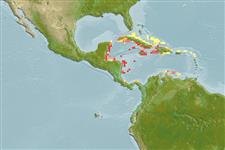>
Ophidiiformes (Cusk eels) >
Dinematichthyidae (Viviparous brotula)
Etymology: Ogilbichthys: Named for the great Australian ichthyologist, J. Douglas Ogilby.; microphthalmus: Specific epithet referring to the minute eyes..
More on authors: Møller, Schwarzhans & Nielsen.
Environment: milieu / climate zone / depth range / distribution range
पारिस्थितिकी
समुद्री प्रवाल-भित्ति संयुक्त; गहराई सीमा 0 - 2 m (Ref. 55786). Tropical
Western Central Atlantic: Haiti, Honduras, and Cayman Islands.
आकार / वज़न / Age
Maturity: Lm ? range ? - ? cm
Max length : 3.8 cm SL (female)
Short description
आकृति विज्ञान | मौरफोमैटरिक्स
पृष्ठीय सौफट रेज़ (सम्पूर्ण): 66-72; ऐनल सौफट रेज़: 53 - 57; जानवरों की रीड़ का जोड़: 40 - 41. The species is distinguished by the following characters: very small eyes (1.1-1.6% SL in diameter); no upper preopercular pore; robust head, length 27.0-29.6%SL); narrow scale band on cheek with 1-2 scale rows on lower par; anterior inner pseudoclasper submerged in pocket of isthmus; otolith with fused colliculi (Ref. 55786).
The minute eyes are indicative that it could be a cave species, but so far collected only on coral reefs. A 31 mm SL female was found with a 3.7 mm long bilobed ovary containing 50 eggs, with 0.4 mm diameter (Ref. 55786).
Life cycle and mating behavior
परिपक्व अवधि | पुनरुत्पत्ति | मछलीऔ का अंडे देना | अंडे | Fecundity | लार्वा
Møller, P.R., W. Schwarzhans and J.G. Nielsen, 2004. Review of the American Dinematichthyini (Teleostei, Bythitidae). Part I. Dinematichthys, Gunterichthys, Typhliasina and two new genera. aqua, J. Ichthyol. Aquat. Biol. 8(4):141-192. (Ref. 55786)
IUCN Red List Status (Ref. 130435)
Threat to humans
Harmless
Human uses
अधिक जानकारी
आम नामउपशब्दचपायचयपरभक्षीईकोटोकसीकोलौजीपुनरुत्पत्तिपरिपक्व अवधिमछलीऔ का अंडे देनाSpawning aggregationFecundityअंडेEgg development
Age/Sizeबाढ़Length-weightLength-lengthLength-frequenciesमौरफोमैटरिक्सआकृति विज्ञानलार्वालारवल गतिकीभर्तीबहुतायतBRUVS
संदर्भजलीयकृषिजलीयकृषि रूपरेखाखींचआनुवंशिकीElectrophoresesहैरेटिबिलटीबीमारीप्रक्रमणNutrientsMass conversion
सहयोगीयोतस्वीरेStamps, Coins Misc.ध्वनिसिगुयटिरारफ्तारतैरने के प्रकारगिल क्षेत्रOtolithsदिमागदृष्टि
साधन
Special reports
Download XML
इंटरनेट स्रोत
Estimates based on models
Preferred temperature (Ref.
123201): 27.4 - 28.2, mean 27.9 °C (based on 164 cells).
Phylogenetic diversity index (Ref.
82804): PD
50 = 0.5078 [Uniqueness, from 0.5 = low to 2.0 = high].
Bayesian length-weight: a=0.01000 (0.00244 - 0.04107), b=3.04 (2.81 - 3.27), in cm total length, based on all LWR estimates for this body shape (Ref.
93245).
Trophic level (Ref.
69278): 3.2 ±0.5 se; based on size and trophs of closest relatives
Fishing Vulnerability (Ref.
59153): Low vulnerability (10 of 100).
